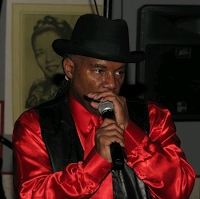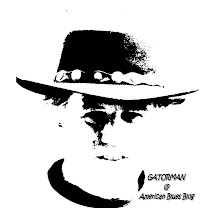If the time period was 400-300 BC and we lived in ancient Greece Watermelon Slim would be Plato, Socrates and Aristotle all rolled up into one. Slim is a very complicated man and a very deep thinker. Some journalist’s have written that he is a member of Mensa. Slim clearly pointed out to me that he is not a member of that intellectual group, although he did qualify for it. It is my opinion Slim is in a much higher intellectual group, the group of creative thinkers that has given the world its greatest masterpieces namely ART. Art is what sets us apart from the rest of the pecking order. Slim manipulates audio like a matador manipulates a bull. He uses a Regal Dobro style guitar to awaken the audio Gods. His musical intellectual level is way above any I've seen or heard. We both are children of the turbulent sixties and share some common experiences.
My friend, Tony Basile (Ana Popovic's USA road manager) and I visited Slims band mates before the show. Tony is close friends with both Cliff (bass) and Ronnie (Guitar). They are another story onto themselves and let’s just say that they are a great asset to Slim.
I interviewed Watermelon Slim at the hotel he was staying in prior to his appearance at Buddy Guy’s Legends this past August 21. Slim, as he likes to be called, is an artist in every sense of the word. He uses all media to express human creativity. He is best known for his music and many of his fans know him for his songwriting and performance abilities.
We knocked on Slims door and he opened it slowly with an Iron in hand. He was in the process of ironing a red shirt for his performance. We found ourselves a seat. Slim stretched out, and lit up a freshly rolled cigarette.
www.chicagobluesnews.com
Tony: The last time I saw you was in August. We did a Festival in wheeling West Virginia. The Wheeling Festival.
Slim: Well, that’s been some time.Tony and Slim talk over each other about how long it’s been and Slim mentions one year and Tony another. (Recorder is in audible at this point)
Slim: I played it in ‘06 too. That’s when my African Thumb piano came up missing. That was my concert quality one.
Tony: It never showed up turned up
Slim: I have never been able to find another one. They don’t make them anymore.
Gatorman: Was it about this big. (I gestured with both hands to indicate a shoe box)
Slim: Smaller than that the tenor variety with seventeen keys. Shu Tracy Kalimba on it.
Gatorman: Will have to put a lookout for it.
Slim: If you can find it that would be great. It used to be reasonably common in music stores.
Gatorman: I think I’ve got one in my shed at home. I’ll have to search for it.
Gatorman: Slim you recorded an album while you were stationed in Vietnam. Is that correct?
Slim: No that is journalism nonsense. I was well out of the Army. The war was still going on.
Gatorman: What year was that?
Slim: I started recording that in 72.
Gatorman: You were out in what 1970?
Gatorman: That was an experience wasn’t it?(Long Pause)
Slim: That’s a whole new interview. You know it didn’t affect me as bad as it did some people. You know with combat. I do not have any claim in with the V.A. I should on a matter of principle, although it takes a long time. I’ve never considered myself disabled so I have never filed. The last thing the V.A. did for me ahh, It turns out I had six wisdom teeth and the army took out four of them. That was that same year 1972.
Gatorman: I thought you were going to say you had 6 wisdom teeth and the army took out 8 of them. Knowing how the military works.
Slim (chuckles): I had earaches in both ears. I knew I had mumps, and I had no idea what the hell was going on up there and one of the doctors cottoned to it right away he said come on down to the dentistry section. They took a panoramic X-Ray and I had four wisdom teeth in my top and two showing and two pushing down on the ones that were showing and that was what was causing the pain and that doctor immediately picked up on that.
Gatorman: I am very interested in how you approach songwriting.
Slim: I’m a journalist as far as my songwriting technique. I’ve always called myself a Musician who can also write. I am a trained writer, a trained observer. I’ve degrees in both observance and writing. I mean you take that song like “Bloody Burmese Blues”. I wrote it the day that the Burmese shot their Buddhist monks in the streets down there in ’07. It was in fact September the 27th. And I just looked at the headlines which was a quote from a couple of English Tourists that were staying in Rangoon that day. They were several stories above the fighting or the shooting or whatever they called it and ah they said “We’re in this lovely hotel looking down at a war zone.” That was the first line of the song. I just started writing the song on the newspaper. The paper was kind of deteriorating you know. That’s kind of the way I write my songs. I see something happen or I hear something happens to me or somebody else and I’m trained to write about it you know.
Gatorman: You have two degrees in Journalism right.
Slim: I have a degree in journalism and two in History.
Gatorman: History?
Slim: Yeah. The first degree is in history and journalism. And then the masters’ degree is in History, to be exact.
Gatorman: You are a member of Mensa also.
Slim: No! I’m not a member of Mensa. I’m going to clean up all these journalistic errors. I’m not a member of Mensa. I qualified for Mensa with the IQ test I took when I entered the military. That was in 1969. I scored 142 in what’s called the AFQT and that put me in Mensa territory. The rest of the story is in 1977 I took my next IQ test to go to Graduate school. By that point I scored 114. So that’s one point a year off for twenty eight years in a row. This is 2009 and that means I’m going to be fighting borderline retardation. I’ve got half-zimers. I can’t remember half of what I use to.
Gatorman: Which half the good half or the bad half?
Slim: You’ll have to ask the resident up here. (Points to head) I’ve got one brain cell working, one on reserve and I try not to call him too often.
Tony: How do you put the music to the words?
Slim: That use to be the hardest thing, because I’m not a great musician. I’m a talented Lyricist.
Gatorman: I like the term artist.
Slim: Overall I’m an artist. Let’s talk more about that in a minute, but what I am is a singer songwriter but with the writer comes the third. I’m a singer first a songwriter before being any kind of instrumentalist. I’m not a great instrumentalist. I’m an above average harp player and I have a unique style in my guitar playing. There is no one that would ever say that I am a technical virtuoso on the guitar. I’m a pretty raw guitarist. I’ve improved my guitar playing more than anything that I’ve been doing since I quit my last truck driving job. The difference is not that I can play just about anything with anybody because I can’t. I’ve become more of a master of my own Style.
Gatorman: You are a true artist.
Slim: Over all I’m an artist, the artist and the artist part does not stop with the music. The artist part, I’m a painter. I’m trying to semi retire, so I can spend more unlimited time with brush and oil and canvas and mixed media going into sculpture and stuff like that. I’ve got more to do then just music. I have a biography that’s in the taxing stage right now. I’m writing a venture with a California newspaper reporter named Michael Kenstrum. (Inaudible at this point. Sorry Michael if I got it wrong). So I’m really trying to semi-retire. I’m having a hard time doing that because I can’t seem to do a bad show.
Gatorman: People really like you. You can’t become a slave to that though.
Slim: Sometimes I just say sorry folks I really have to live my own life. I’m going through this with my band right now, because my band depends on me for their income. You know at some point in time I’d like to be able to say I’m going home for awhile. At some point I’d like to say it’s about me, but I’m having a very difficult time saying that.
Tony: I think everyone does.
Slim: It’s very hard to say no to people. I’m recording another record in October. I didn’t even really mean to set myself up for the one I recorded that came out.
Gatorman: “Escape From the Chicken Coop”?
Slim: Yeah. “The Chicken Coop”. I didn’t really, but I tried to warn them that they would not make money on this record. I tried to warn them that I really wasn’t interested in touring it or doing anything with this album. I liked to be not doing as much as I am. One of the reasons I would find it hard to be a journalist in this day and age is because of touch typing. In order to do the work well you have to touch type. Fifteen articles a day.
Gatorman: I’ve a hard time with one.
Slim: I just don’t because I’m a two finger typer
Gatorman: Do you like story writing as opposed to songwriting. They are just about one in the same.
Slim: I don’t write fiction. My songs tend to be autobiographical. Not all, by any means. I have never gotten any farther than the beginning stages of a novel or a play. There is a play rumbling around in there that needs to be done at some point. About the mafia only Ionic Pentameter Shakespeare style like the Soprano’s.
Gatorman: I understand that you carry the complete works of Shakespeare with you. Is that true?
Slim: Oh yeah. I’m not carrying it now. But I do sometimes. In fact I carried it around in England. It made an impression there.  GATORMAN
GIFTS?
GATORMAN
GIFTS?
 GATORMAN
GIFTS?
GATORMAN
GIFTS?
© Copyright Terrance B. Lape all rights reserved. Reproduction of this website, in whole or in part, in any form or medium without express written permission from author is prohibited. All use is subject to our Terms of Use
Some photos by Kathy Crnich















![Reblog this post [with Zemanta]](http://img.zemanta.com/reblog_e.png?x-id=31f83664-9d17-4e03-8d48-10791ff39ca1)



![Reblog this post [with Zemanta]](http://img.zemanta.com/reblog_e.png?x-id=cca8c8f2-b9ea-4828-a3c5-b98a4e23465f)






